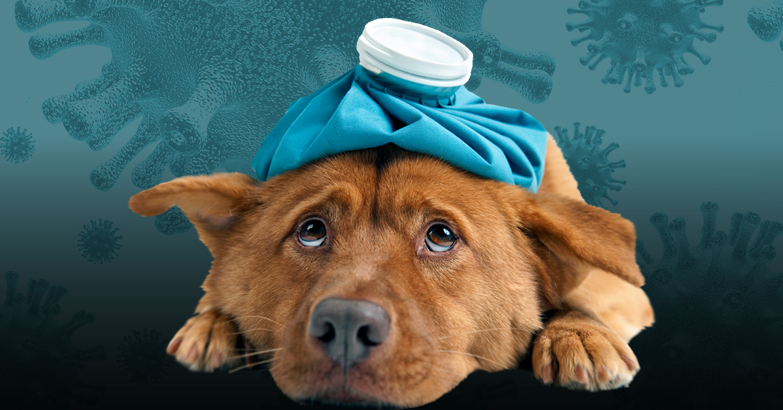Respiratory infection in dogs is also known as Canine Infectious Respiratory Disease Complex (CIRDC). Or even more commonly: kennel cough. It’s common among dogs, and for the most part, it’s generally mild with a persistent dry cough and seldom becomes a serious respiratory infection in dogs.
However, since summer 2022, a more serious respiratory disease has infected dogs with pneumonia-like symptoms. And unlike kennel cough, which generally presents symptoms a week after exposure and runs its course within 2 weeks, a dog with this more serious infection may not develop symptoms for 1 to 3 weeks … and it escalates rapidly into pneumonia.
Read on and learn the difference between canine pneumonia, upper respiratory infections in dogs, and kennel cough. We’ll walk through the causes, symptoms, and treatments for each.
Canine Pneumonia
In 2022 the respiratory disease appeared to be concentrated in New Hampshire and northern Massachusetts. However, through the summer of 2023, dog pneumonia cases increased across the country.
There have been new cases in other locations, such as Florida. Oregon, California and Michigan. Other states reporting various types of respiratory infections are Texas, Ohio, Wyoming, and North Carolina.
Canine Pneumonia Diagnosis
There’s a list of common respiratory disease symptoms below. In the early stages, pneumonia may look like kennel cough, with a honking cough and nasal discharge. But dogs who develop pneumonia may be lethargic, refuse food or have difficulty breathing. Some may have a fever as well. If your dog has these symptoms, get him to your vet right away.
Vets will use several types of tests to diagnose dog pneumonia. Cornell University’s College of Veterinary Medicine recommends veterinarians use some of the following tests, in addition to standard blood tests:
- Bacterial culture (aerobic and anaerobic)
- Canine respiratory panel to rule out different types of respiratory disease
- Tracheal wash cytology
- Virus isolation
Causes Of Dog Pneumonia
The causes of this illness aren’t well understood.
Like kennel cough, the infection spreads through dogs in close contact at day care, shelters, kennels, groomers and dog parks where they share toys. But some cases reported no dog-to-dog contact. And because there seems to be a long incubation period, it’s proving difficult to trace the disease in specific cases.
Let’s look more closely at upper respiratory infections in dogs that share the same symptoms and have successful treatment options.
Dog Pneumonia Treatment
Dogs with pneumonia typically receive overnight care and medication. They may be put on oxygen or nebulizers. Some dogs are non-responsive to medication. Dogs tested have been negative for bordetella, influenza and coronavirus.
If your dog has a pneumonia diagnosis and you already work with a holistic vet or homeopath, ask for their advice on whether you can manage the condition at home with their guidance. Otherwise, given the severity of some pneumonia cases, your dog may need to be hospitalized.
Upper Respiratory Infection In Dogs
An upper respiratory infection in dogs is any condition that affects the lungs, airways, and nasal passages. You might also hear it referred to as canine respiratory disease.
Symptoms of Respiratory Infection In Dogs
Symptoms of a respiratory infection in dogs can vary depending on the infection and the underlying cause. Some of the most common symptoms include:
- Coughing: A dry or moist cough is common in most types of respiratory disease. It may be persistent and can worsen with exercise or excitement. Dogs may cough up white or yellow foamy discharge.
- Sneezing: Frequent sneezing, often accompanied by nasal discharge.
- Difficulty breathing: Labored breathing or shortness of breath, including rapid or shallow breathing, can be a sign of a serious respiratory infection like pneumonia.
- Fever: A high body temperature (above 101.5°F or 38.6°C) suggests the presence of an infection.
- Loss of appetite: Suggests a more serious infection, possibly pneumonia.
- Lethargy: Dogs with a more serious infection like pneumonia may be lethargic or weak.
- Nasal discharge: A runny nose or discharge from the nostrils can be a sign of an infection in the upper respiratory tract.
- Eye discharge: Some respiratory infections can cause discharge from the eyes, such as conjunctivitis.
RELATED: Natural cough medicine alternatives for dogs …
Causes Of Respiratory Disease and Infection In Dogs
Respiratory infections in dogs can be caused by viruses, bacteria, fungi, and parasites. Some of the most common causes of respiratory infections in dogs include:
- Canine flu: A highly contagious virus causes respiratory symptoms similar to those of human flu.
- Kennel cough: Respiratory infections caused by a combination of bacteria and viruses that is highly contagious in crowded conditions such as boarding kennels, dog shows or shelters.
- Pneumonia: An infection of the lungs caused by bacteria, viruses or fungi.
- Canine distemper virus: Viral infection causing respiratory symptoms as well as neurological symptoms, and can be fatal.
- Bordetella bronchiseptica: A bacterium that is one of the causes of kennel cough.
- Fungal infections: Blastomycosis, histoplasmosis, and aspergillosis can infect the respiratory tract of dogs.
- Parasites: Lungworms or heartworms can also infect the respiratory system of dogs.
Dogs who are stressed, live in overcrowded conditions, have poor nutrition, weakened immune systems, and are exposed to infected animals or environments are at greater risk for an infection.
RELATED: Immune system boosters for dogs …
5 Natural Remedies For Respiratory Infection In Dogs
Here are some natural remedies that may help ease respiratory infections in dogs. Again, if you suspect pneumonia, don’t try to manage it at home without professional support.
- Steam therapy: A steamy shower running can help clear the airways and ease congestion. They don’t need to be in the shower, just allow them to breathe the steam.
- Manuka honey has natural antibacterial and anti-inflammatory properties that can help soothe a sore throat and cough. Mix a small amount of honey into your dog’s food or offer it on a spoon.
- Echinacea: This herb can help boost the immune system and reduce inflammation. It can be given in the form of a tincture or supplement.
- Vitamin C: Vitamin C can help support the immune system and reduce inflammation. You can feed foods rich in vitamin C such as strawberries and bell peppers, or give a vitamin C supplement, preferably naturally-sourced, not lab-made like ascorbic acid.
- Fluids: It’s important to keep your dog hydrated, especially if he has a fever or isn’t eating as much as usual. You can also feed a low-sodium broth or homemade bone broth.
RELATED: Natural antibiotic remedies may help …
Is There A Difference Between Kennel Cough and Upper Respiratory Infection In Dogs?
Yes, there is. These are two different conditions but they can have similar symptoms.
Kennel cough, also known as infectious tracheobronchitis, is a highly contagious respiratory disease caused by a variety of viruses and bacteria. It’s often spread through contact with infected dogs. The main symptom of kennel cough is a persistent dry cough, often accompanied by retching or gagging, that can last for several weeks. Other symptoms may include nasal discharge, sneezing and fever.
Upper respiratory infection (URI) is a general term used to describe infections that affect the nose, throat and/or sinuses. URIs in dogs can be caused by viruses or bacteria, and may result in symptoms such as coughing, sneezing, nasal discharge, and fever. URIs can also cause secondary infections, such as pneumonia.
While kennel cough is a specific type of respiratory infection, URIs can have a variety of underlying causes and may not always be related to contact with other dogs in a kennel or shelter environment.
Here are 2 other types of respiratory infections in dogs.
2 Common Canine Respiratory Infections
Canine Chronic Bronchitis
Canine chronic bronchitis is an infection of the lower respiratory tract involving chronic inflammation and irritation of the airways. It’s also known as chronic obstructive pulmonary disease (COPD) or chronic bronchitis complex.
This is believed to be related to long-term exposure to irritants like cigarette smoke, dust and pollution. It’s more common in certain breeds, such as small breeds and brachycephalic (flat-faced) breeds.
Symptoms can include coughing, wheezing, exercise intolerance, difficulty breathing, lethargy, decreased appetite, and weight loss. It can also lead to secondary infections, such as pneumonia because of inflammation and damage to the airways.
Eosinophilic Bronchopneumopathy
Eosinophilic bronchopneumopathy (EBP) is characterized by inflammation and increased numbers of eosinophils (a type of white blood cell) in the airways and lungs. It’s thought to be related to an immune system response to inhaled irritants, allergens or parasites. EBP is more common in young to middle-aged dogs and certain breeds like German Shepherds and Rottweilers.
Symptoms are similar to respiratory infections and canine chronic bronchitis. EBP can also lead to secondary infections, such as pneumonia, due to inflammation and damage to the airways.
Conventional care involves “anti” medications (such as antibiotics or antifungals), along with hydration and nutrition, and in severe cases, hospitalization. But to give your dog the best chance of fighting a respiratory infection, your dog needs a healthy immune system … and that starts with a fresh whole food diet.
I Can’t Tell If My Dog Has a Canine Respiratory Infection, Kennel Cough, or Pneumonia
As dog owners, it can be tough to self-diagnose exactly what your dog is dealing with. If you have any doubt, it’s best to take your dog to your holistic vet. She can use diagnostic testing to get to the bottom of what’s ailing your pup.
The last thing you want to do is think your pup has a mild respiratory illness when he actually has a severe respiratory disease like canine pneumonia.
So if your dog’s having difficulty breathing, is lethargic and off his food, take him to your vet immediately for diagnosis in case it’s pneumonia. Don’t attempt to treat pneumonia at home unless you’re working closely with your holistic vet.
FAQ
How do you treat a respiratory infection in a dog? Treatment for a respiratory infection in dogs often involves antibiotics prescribed by a veterinarian if the infection is bacterial, along with supportive care like humidifiers and proper hydration; viral infections are treated symptomatically.
How long does a respiratory infection last in dogs? The duration of a respiratory infection in dogs can vary but typically lasts anywhere from 1 to 3 weeks, depending on the cause and the effectiveness of the treatment.
What are the symptoms of a respiratory tract infection in a dog? Symptoms of a respiratory tract infection in a dog include coughing, sneezing, nasal discharge, lethargy, loss of appetite, and difficulty breathing.
Can a dog get over a respiratory infection without antibiotics? If the respiratory infection is viral, a dog may recover without antibiotics through supportive care, but bacterial infections require antibiotic treatment prescribed by a veterinarian for resolution.











